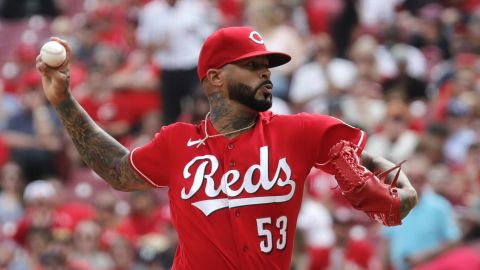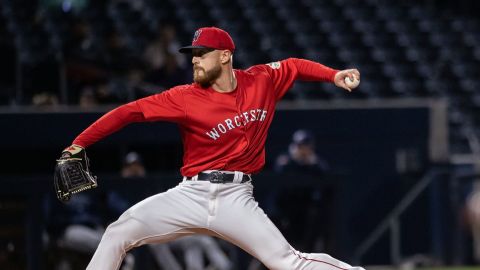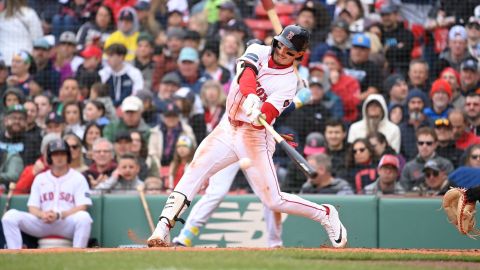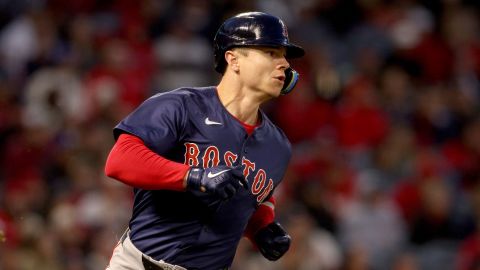 You’ve got to beat the best to be the best. And while the Red Sox may have held the American League’s best record during the regular season, the Tigers are still the defending AL champs.
You’ve got to beat the best to be the best. And while the Red Sox may have held the American League’s best record during the regular season, the Tigers are still the defending AL champs.
Detroit’s title defense nearly came to an end in the ALDS, as the Athletics pushed the Tigers to the brink before Justin Verlander stymied Oakland in a winner-take-all Game 5 to secure a date with the Red Sox in ALCS. Now, the Red Sox and Tigers will battle in the postseason for the first time ever, which is strange when you consider the long history of each club.
The Red Sox enter the series looking like a team of destiny. Boston’s bearded bunch has transformed what many considered to be a “bridge year” into a year filled with World Series aspirations. Those high hopes — like the beards — grew a little bit more when Koji Uehara struck out Evan Longoria on Tuesday to give the Red Sox a 3-1 series victory over the Rays in the ALDS.
The competition only figures to get stiffer, though. While the Rays posed a difficult matchup for the Sox, the Tigers’ overall talent is much greater. With a rotation anchored by the 1-2 punch of Verlander and Max Scherzer, an offense spearheaded by the game’s best hitter in Miguel Cabrera and a wily veteran in Jim Leyland pulling the strings as manager, the Tigers were seen as the AL favorites back in spring training. Not much has changed in the Motor City.
So, here we are; The improbable versus the expected. Last year’s chumps versus last year’s champs. Detroit versus Boston for a trip to the World Series.
Before the two teams kick things off, let’s see how they stack up.
Starting rotation
Here’s a look at the pitching matchups — for the first four games at least:
Game 1 at Boston: Jon Lester, LHP vs. Anibal Sanchez, RHP
Game 2 at Boston: Clay Buchholz, RHP vs. Max Scherzer, RHP
Game 3 at Detroit: John Lackey, RHP vs. Justin Verlander, RHP
Game 4 at Detroit: Jake Peavy, RHP vs. Doug Fister, RHP
We’ll stop there. Games 5-7 are a whole different beast, and a lot could change between now and Thursday. You get the point, though. The rotational matchups are going to be comprised of these eight guys.
A lot of people — myself included — gave the Rays a distinct advantage over the Red Sox in the starting pitching department last series, yet Boston proved to have the better arms from top to bottom. Naturally, that makes it a little more difficult to pick against the Red Sox’ starters in the ALCS, even though the Tigers have the clear-cut advantage by virtue of the deepest rotation in baseball.
Tigers starters finished the regular season with an MLB-best 25.3 wins above replacement (WAR). The next-best team was the Rangers, whose starters had a 16.0 WAR. Red Sox starters finished third with a 15.9 WAR.
Tigers starters also finished with the best strikeouts per nine innings mark (8.63), fourth-best ERA (3.44) and fifth-best WHIP (1.21). Detroit’s top four — Verlander (3.40, seventh), Scherzer (2.87, third), Sanchez (2.60, first) and Fister (3.41, eighth) — all finished in the top eight in defense-independent ERA, which projects what a pitcher’s ERA would have been if not for the effects of defense and luck on the actual games in which he pitched. Oh yeah, and Verlander hasn’t allowed a run since Sept. 18 — a span of four starts and 27 innings.
Basically, this is the long way of saying that the Tigers’ rotation is really, really, really good. Boston’s rotation has been solid as well, but Detroit’s rotation has been otherworldly.
Advantage: Tigers
Bullpen
Here’s a look at each team’s bullpen:
Red Sox:
Koji Uehara, RHP
Junichi Tazawa, RHP
Craig Breslow, LHP
Brandon Workman, RHP
Franklin Morales, LHP
Ryan Dempster, RHP
Felix Doubront, LHP
Tigers:
Joaquin Benoit, RHP
Drew Smyly, LHP
Jose Veras, RHP
Al Albuquerque, RHP
Rick Porcello, RHP
Jose Alvarez, LHP
Luke Putkonen, RHP
Tigers starters led the majors with 1,023 innings pitched during the regular season. And it’s a good thing, because the bullpen wasn’t that good.
The Tigers’ bullpen ranked 24th in ERA — the worst mark of any team that qualified for the postseason. The unit ranked 23rd in WHIP (1.34) and 23rd in walks per nine innings (3.66).
The Red Sox, despite having bullpen concerns of their own throughout the year, have a much deeper relief corps. Boston’s “Big Three” of Koji Uehara, Junichi Tazawa and Craig Breslow was tremendous in the ALDS, and John Farrell said Thursday that he’d be willing to use one of the team’s starters — likely Jake Peavy — out of the bullpen later on in the series if necessary.
The Red Sox’ offense loves to grind out at-bats and elevate pitch counts. That could be huge in this series, as it’s all about getting to the Tigers’ bullpen.
Advantage: Red Sox
Offense
This series will feature two of the best offenses in baseball. Picking one over the other is a chore, to say the least.
Miguel Cabrera (even at less than 100 percent) and Prince Fielder comprise arguably the most lethal combinations in the majors, and Victor Martinez is swinging the bat extremely well, too.
The Red Sox, meanwhile, have been “relentless” — to once again use Farrell’s spring training phrase — and never give away at-bats. That approach, along with aggressive baserunning, has allowed the Red Sox to manufacture runs and build big innings, even when hits are tough to come by.
The Red Sox led the majors in runs scored this season with 853, while the Tigers finished second with 796. The Red Sox were second in average (.277), first in on-base percentage (.349) and first in OPS (.795). The Tigers were first in average (.283), second in on-base percentage (.346 and second in OPS (.780).
It’s hard to pick against the Tigers in this area, especially since they have the best hitter on the planet in Cabrera, but the top of the Red Sox’ order is playing really well right now. Jacoby Ellsbury and Shane Victorino should be difference-makers — just as they were during the ALDS. Tigers leadoff man Austin Jackson, meanwhile, went 2-for-20 with 13 strikeouts in the ALDS, and any continued struggles from him will minimize Cabrera’s and Fielder’s opportunities to drive in runs.
As Jon Lester mentioned Friday, the Red Sox can live with solo shots to Cabrera and Fielder. Ultimately, I think the Red Sox’ lineup has more to offer No. 1 through 9, even if the star power isn’t on the same level.
Advantage: Red Sox
Bench
This is where the two teams really differ. The Tigers will rely mostly on the players in their starting lineup, while the Red Sox will be willing to empty their bench in the hopes of exploiting matchup advantages.
No one compares to the Red Sox in terms of overall depth, and this series isn’t any different. All four of the Tigers’ starters are right-handers, so Jonny Gomes and Xander Bogaerts will be waiting in the wings for an opportunity to face either Drew Smyly or Jose Alvarez late in the game. (We may even see Bogaerts start Game 2 if Will Middlebrooks doesn’t produce in Game 1. ) Plus, Mike Carp, David Ross and Quintin Berry will all be licking their chops to make an impact.
This is no contest, really.
Advantage: Red Sox
Defense
This is another area in which the Tigers can be exposed.
The Tigers’ corner fielders, Cabrera and Fielder, are game-changers offensively, but they’re liabilities defensively. That could be huge against a Boston offense that keeps the pressure on while scratching and clawing for runs.
Farrell said before the ALDS that he expected there to be a swing moment defensively, and we saw that right away with Wil Myers’ mishap in right field in Game 1. It wouldn’t be shocking to see the Tigers’ infield get exposed at some point in this series, whether it be a simple error or failing to adapt to the Red Sox’ aggressive baserunning.
Advantage: Red Sox
Manager
John Farrell will likely be asked to do more in this series, particularly when it comes to picking the right spots to use his bench. Therefore, his impact — whether positive or negative — will be much more obvious than Leyland’s.
I thought Farrell’s willingness to correct a previous wrong in Game 5 was both bold and encouraging. Farrell clearly isn’t steadfast in his ways, and that’s a breath of fresh air given the usual stubbornness of major league managers. However, making an initial mistake again could prove costly. The stakes are raised and the competition is heightened. We might not see many second chances.
I’m going to give Leyland the nod here based solely on experience, although I think Farrell continues to do a heck of a job for the Red Sox.
Advantage: Tigers
Prediction
Red Sox in six.
The Tigers have all the talent in the world. But believe it or not, the Athletics would have posed a tougher matchup despite their lack of star power.
The Red Sox can drive up pitch counts. And as good as the Tigers’ starters have been, they ranked 20th in the majors with 283 walks issued. If the Red Sox can get into the Tigers’ questionable bullpen, we could see Boston do some damage in the second half of ballgames.
There are also questions about the Tigers’ infield defense, and that could be Detroit’s kryptonite given how the Red Sox’ offense operates.
Have a question for Ricky Doyle? Send it to him via Twitter at @TheRickyDoyle or send it here.




